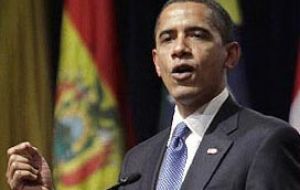MercoPress. South Atlantic News Agency
Obama tells Unasur members US and Cuba are “on a path of change”
 Pte. Barack Obama during the UNASUR - USA summit at Pto. España
Pte. Barack Obama during the UNASUR - USA summit at Pto. España South American leaders pressed President Barack Obama on Saturday to end the US economic embargo on Cuba and abstain from interventionist policies as he attempts to reshape US hemispheric relations. Obama was quoted saying that the US and Cuba are “on a path of change”
Obama is attending the fifth Summit of the Americas in Port of Spain, Trinidad and Tobago and met with heads of the 12-member Union of South American Nations, UNASUR, ahead of the summit’s first plenary session.
Brazilian President Lula da Silva told Obama that another Summit of the Americas without Cuba was unacceptable. “The big test is progress in relations with Cuba” said Brazil’s Foreign Minister Celso Amorim. “A small step was taken in the right direction. But there needs to be direct dialogue, discreet in the beginning. That’s what Lula told Obama needs to take place”.
Before the meeting with South American leaders Obama made brief comments:
“UNASUR is doing some excellent work in integrating efforts in the region around things like energy and security. I have a lot to learn,” he said.
A senior US official who attended the meeting said President Obama expressed a desire to work with UNASUR nations to confront economic, environmental, and energy challenges.
The official said more than one leader pressed Mr. Obama to end the decades-old embargo of Cuba. Obama is said to have declared that the United States and Cuba are “on a path of change, but it won't happen over night” while reminding his fellow heads of state that the democratic process that brought them into office does not exist in Cuba. He also referred to human rights and political prisoners in the island.
”You are all democratically elected,“ Mr. Obama told them, ”and we all need to have an interest in promoting democracy and the rule of law“ in Cuba as well.
President Obama is said to have stated that, while the past must be understood, he is not there to argue history - and that it is time to ”move on” to confront today's challenges.
Argentine president Cristina Fernandez de Kirchner described the morning meeting with president Obama “as extremely useful”, and an excellent opportunity to recover “confidence”.
“It was a good debate, the way I like it, no stridency and each of us putting forward his position”, said Mrs Kirchner. “The different countries were able to talk about their relations with United States”.
“Now let’s hope that all that was said become reality; I think it’s a historic opportunity to change history”, added the Argentine president who also revealed that “some of us told Mr. Obama about the interference of US officials in the policies of Latinamerican countries. We don’t have officials taking position every time the US makes a decision”.
“President Obama told us it was necessary to look into the future; that he hadn’t come to debate the past, but to begin building a new path all of us together. But he also pointed out that ‘you can’t blame the US for every problem in this hemisphere’” said Mrs. Kirchner.
Finally “we admitted he’s only been in office three months and that we still have much to advance”.
Before the talks begun, chaired by Chile’s Michelle Bachelet, Venezuela’s Hugo Chavez presented Mr. Obama with an academic book on precisely the subject of 500 years of Latinamerican intervention by Europe and the US. The book written by a Uruguayan journalist was on “special offer” ten minutes later on the web by Amazon.
Saturday's Obama-Chavez encounter was the second of the summit, and provided another opportunity for a handshake between the two men. Mr. Obama was asked what he said to the fiery critic of the United States during their first handshake. “¿Cómo estás?” I told him.
The summit's schedule includes three plenary sessions before a final declaration is issued Sunday. Venezuelan President Chavez threatened to refuse to sign the declaration to protest Cuba's absence from the hemispheric gathering, and to protest the document's failure - as it is now reportedly written - to demand an end to the US embargo of the island.




Top Comments
Disclaimer & comment rules-

Read all commentsI find it puzzling that CARICOM has joined the bandwagon to demand the end of the U.S. trade embargo on Cuba when it would spell the death knell of its tourism industry and wipe out any chance of developing alternative competitive services industry such as providing medical services to overseas patients.
Apr 20th, 2009 - 12:12 am 0Commenting for this story is now closed.
If you have a Facebook account, become a fan and comment on our Facebook Page!